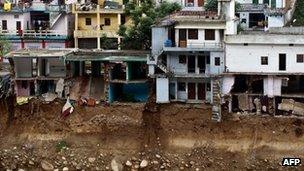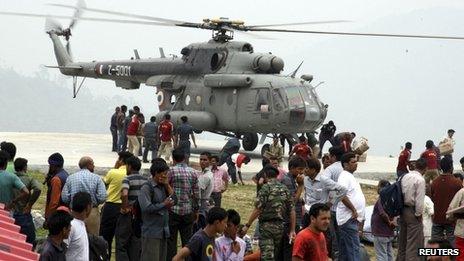India floods: A journey through Uttarakhand's flooded landscape
- Published
The BBC's Sanjoy Majumder visits a town left encased in mud by the floods
Devastating floods in India's mountainous state of Uttarakhand damaged roads and destroyed buildings frustrating the efforts of relief workers. The BBC's Sanjoy Majumder took a journey into the mountains and found ghost towns and abandoned homes.
As we drive into the mountains it begins to rain, hard, just as it has for much of the past week.
We are on the main highway leading from Rishikesh, in the foothills of the Himalayas, to Rudraprayag town and beyond to the Hindu temple towns of Kedarnath and Badrinath.
The Ganges river snakes alongside - its normally crystal blue waters are completely muddy because of sediments from the floods and landslides further up.
Usually this highway is a busy one, filled with buses carrying pilgrims either on their way to the Hindu shrines or back from their spiritual journey.
But for the most part now, there is hardly any traffic. It is easy to see why.
The road has been damaged in places and is so narrow in parts that only one vehicle can pass at a time.
At Devprayag, where the Alakananda and Bhagirathi rivers meet to form the Ganges, part of the highway has been washed away. Workers are busy trying to rebuild it.
Ghost town
A few hours into our drive and the first real impact of the floods becomes apparent.
Just outside the town of Srinagar, we drive into a settlement that is completely buried in the mud.
The tops of a few houses are visible and a few cars stick out from the sand that has been left behind after the flood waters retreated.

Many homes have been damaged by the flood waters and landslides
It is eerily silent, like a ghost town.
I finally meet a young man who is from a neighbouring village.
"There used to be 70 houses here," he tells me. "Most of them were washed away."
I walk into what used to be the local polytechnic. Its various buildings - the library, the science block, the hostel - are all covered with mud almost up to the roof.
I peer into the window of what was clearly a classroom on the second floor - it is now at the level of my knees and I can see the ceiling fans inside. The rest of it is completely covered with earth and muck.
I find the college principal, Sanjeev Kumar, deep in conversation with a few officials as they survey the damage.
"It rained for 60 straight hours because of which the Alakananda, which flows alongside, broke its banks and we were flooded," he says.
"Everything here was under 30 feet of water. The students rushed out of their hostel, leaving everything behind. Now there's nothing left. Their clothes, books, our equipment - all gone."
We press on and join a convoy of trucks carrying relief material heading up.
Just outside Rudraprayag we come to a grinding halt. It is soon obvious why.
Frustrating wait
Ahead of us, a 50-metre section of the road is missing. It has caved in because of a landslide. Some 200 vehicles are stranded at both ends as bulldozers try and clear an alternate path.
It is a frustrating wait especially for a group of volunteers who have come from Delhi with several truckloads of critical supplies.
"We are carrying biscuits, water and medicines," one of the volunteers - all dressed in bright red t-shirts - tells me.

Indian armed forces have carried out the country's largest ever rescue operations
"We're headed for Badrinath, we've heard there are many people there who need our help."
They have already spent three hours waiting and it is not clear how much longer it will take.
Up ahead, the road to Badrinath is clear.
But the highway to Kedarnath, the worst affected area, is completely blocked. The only way to get there is to trek through the thickly wooded mountains. Or from the air.
Up above us, an Indian air force helicopter flies past in one of several hundred missions in what has been the country's largest ever rescue operation.
Among those brought down is a group of Westerners who had come here for a spiritual retreat on the banks of the Ganges.
"We woke up to the news that the bridge leading to our ashram over the river had been swept away," says Vishaal Kishore, who was born in Essex, in the UK.
"We realise now how incredibly lucky we are to have got out."
The local villagers were the first to come to their aid.
"These people had lost everything, their homes, their belongings," Mr Kishore says.
"Yet they found time to cook food for us and cut a path through the mountain to help us out."
Most of those stranded in the mountains, mostly Hindu pilgrims and tourists, have now been evacuated.
But the focus is now shifting, as it must, to those left behind - villages and local communities which have been completely destroyed.
It could take months before their homes and their lives are rebuilt.
- Published27 June 2013
- Published24 June 2013
- Published20 June 2013
- Published25 June 2013
- Published22 June 2013